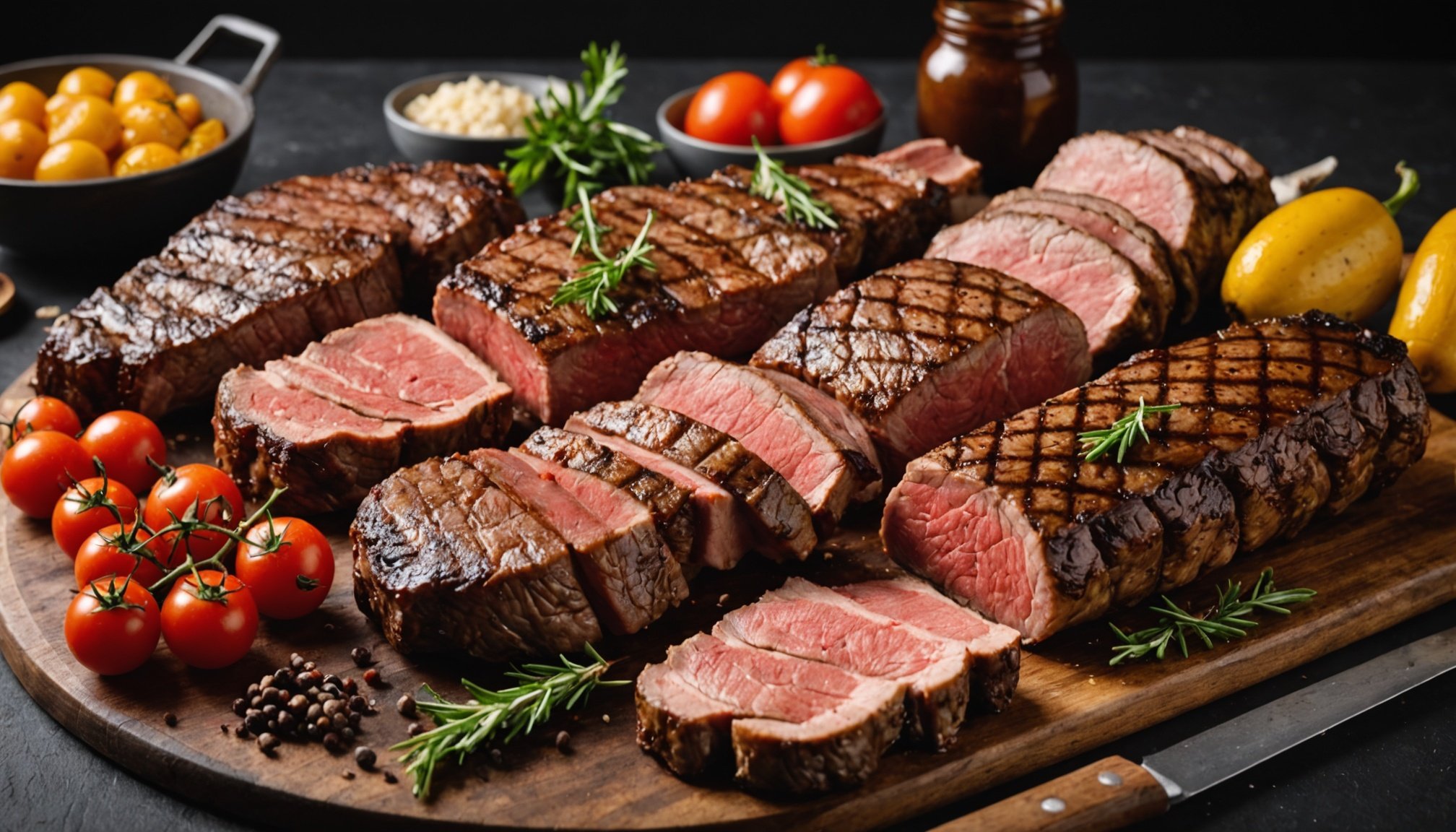Understanding the Importance of Quality Meat Suppliers
Choosing the right meat suppliers is crucial for a steakhouse aiming for success. High-quality meat directly impacts both the flavour and dining experience offered to patrons. When premium meat is sourced, it brings a richness and depth to dishes that resonates with customers, enhancing their overall dining pleasure.
Investing in premium quality meat is not merely a culinary decision but also a financial one. While superior meat might come with a higher upfront cost, its impact on flavour can lead to increased patron satisfaction and repeat business. In contrast, opting for inferior meat might reduce costs initially but could result in a subpar dining experience. This, in turn, may impact a steakhouse’s reputation negatively, ultimately affecting profitability.
Also to see : Mastering Pristine Draft Beer Lines: Expert Tips for Flawless Craft Brewery Maintenance
Steakhouses committed to excellence must ensure their suppliers meet high standards, as consistent quality is key. By valuing the role of exceptional meat supplies, establishments can maintain a robust reputation, leading to sustained business success. Therefore, the selection of a premium meat supplier helps create a memorable dining experience that customers will want to revisit.
Key Factors to Consider When Choosing a Meat Supplier
Selecting the right (meat suppliers) involves understanding key criteria to ensure high-quality deliveries. The process begins with evaluating a supplier’s sourcing practices—how they rear and process their meat ensures transparency in operations, an essential trust factor for any (steakhouse sourcing) strategy.
Topic to read : Transform Your Bar: Master Layout Design for Efficient Service and Exceptional Customer Experience
Next, pay attention to quality assurance protocols. Certifications like USDA or organic labels provide assurance of meeting particular standards. Suppliers should continuously show proof of quality assessments, ensuring that they comply with rigorous health and safety criteria needed for premium quality meat.
Additionally, the supplier’s reputation in the culinary community plays a crucial role in decision-making. Gathering insights from industry peers can be invaluable. A well-regarded supplier is more likely to deliver consistently and address issues promptly.
Finally, delve into supplier evaluation, which combines all facets of performance: from logistics to customer service. Visiting their facility may provide better insight into their practices and commitment to excellence. With thorough investigation into these areas, steakhouses can cultivate a list of potential suppliers poised to deliver both exceptional products and service longevity.
Evaluating Supplier Offerings and Pricing Structures
Understanding the dynamics of meat pricing is essential when evaluating supplier offerings. Suppliers may employ various pricing models, influenced by factors such as market demand and regional availability, which directly impact budgeting for a steakhouse. Thus, gaining a comprehensive understanding of these models aids in predicting costs and ensuring financial viability.
When examining different suppliers, a comparative analysis of product ranges is vital. This involves assessing the diversity and quality of their offerings. It is crucial to identify any distinctive options, such as specialty cuts or unique processing methods, that could enhance the menu. Such a thorough evaluation helps in determining which supplier provides the best value for the money spent.
Identifying the value in premium pricing is another key aspect. Superior meat often commands higher prices due to its improved flavour, texture, and origin. However, this investment can result in a higher-quality dining experience, potentially increasing customer satisfaction and loyalty. By weighing the benefits of premium pricing against the cost implications, steakhouses can make informed decisions, ultimately enhancing their offerings and maintaining a competitive edge within the industry.
Evaluating Customer Service and Supplier Relationships
Meaningful connections between a steakhouse and its meat suppliers go beyond business; they hinge on effective communication and mutual understanding. Reliable communication is critical for efficient inventory management. It ensures timely deliveries and adjustments in supply, optimising operations and minimising disruptions.
To maintain strong relationships, cultivating open dialogue with suppliers is essential. Consistent feedback and regular updates about restaurant needs and market changes reinforce trust and collaboration. Employing strategies like joint planning sessions or periodic evaluations can foster long-term partnerships.
Recognising red flags in customer service can prevent poor supplier choices. Irregular order fulfilment or unresponsive communication often indicate deeper issues. A supplier’s willingness to address concerns promptly reflects their commitment to the relationship and service quality.
Effectively managing these elements can lead to a more seamless supply chain and enhance business relationships. Strong supplier relationships not only support operational success but also enhance the quality of meat offered, ensuring a superior dining experience. Proactive interaction with suppliers is key in staying ahead in the competitive world of steakhouses, ultimately resulting in satisfied customers and sustained business growth.
Case Studies: Successful Steakhouse Suppliers
Understanding key examples of successful suppliers can provide invaluable insights into the steakhouse industry. Prominent industry case studies showcase partnerships where selecting exquisite meat has led to culinary achievements and boosted reputations.
One exceptional case relates to a renowned steakhouse in New York. This establishment partnered with a specialty supplier renowned for its organic and sustainably-sourced meats. This relationship highlighted the importance of choosing a supplier that complements the restaurant’s vision for quality and sustainability. By offering exclusive cuts that are not widely available, the steakhouse could distinguish itself in a competitive market.
Through these collaborations, chefs can emphasise the influence of premium suppliers on their creative process. Notable testimonials from expert chefs underline the difference quality meat makes. Many highlight how these partnerships supported innovation in their menu offerings, reflecting the chef’s commitment to excellence.
However, not all experiences are positive. Lessons from failed partnerships underscore the risks of inadequate vetting and complacency. In summary, choosing the right supplier can strengthen a steakhouse’s brand, with real-life success stories and expert endorsements providing both inspiration and a cautionary framework.
Regional Considerations and Specialty Suppliers
Choosing between regional suppliers and national distributors can significantly influence a steakhouse’s offerings and market appeal. Local sourcing has several advantages, including fresher products and support for the local economy. Regional suppliers often offer unique cuts and specialty products not available from larger national distributors. This variety can enable a steakhouse to distinguish itself with exclusive menu items that draw customers.
Specialty meat sources provide a focus on quality and distinctiveness, often emphasising sustainable and ethical farming practices. These suppliers cater to niche markets and offer meats from specific breeds, enhancing flavour profiles and customer appeal. Regional artisans might focus on traditional methods, adding depth and authenticity to their offerings.
The impact of sourcing practices on meat quality is significant, influenced by factors such as climate, feed, and animal welfare standards. For example, harsher climates may yield harder meat textures, while ethically-raised animals typically produce superior flavour. Understanding these regional nuances is crucial when deciding between local and national product sources, as it directly affects the quality and diversity of the steakhouse menu. By engaging with regional suppliers, steakhouses can enhance both their culinary repertoire and ethical stance.
Practical Tips and Checklist for Choosing a Supplier
Selecting the ideal meat suppliers demands meticulous planning and evaluation. A robust decision-making process involves a thorough meat supplier checklist to guide steakhouses towards optimal choices. Here are some actionable tips for facilitating a comprehensive supplier assessment:
-
Step-by-step guide: Begin by identifying your steakhouse’s specific meat requirements, such as frequency of delivery, preferred cuts, and flavour profiles. This will narrow down potential suppliers who can meet these needs effectively.
-
Key questions to ask: When meeting with suppliers, inquire about their sourcing and production methods. Ask about their quality control protocols, certification for premium quality meats, and how they handle unexpected disruptions or order changes.
-
Supplier evaluation checklist: Include criteria such as the supplier’s reputation, client testimonials, and previous experiences within the industry. Assess logistical capabilities like delivery reliability and response time to queries or issues.
By systematically approaching supplier selection, steakhouses can ensure they partner with suppliers who not only enhance their menu offerings but also align with their business ethos, ultimately supporting sustained success and customer satisfaction.

